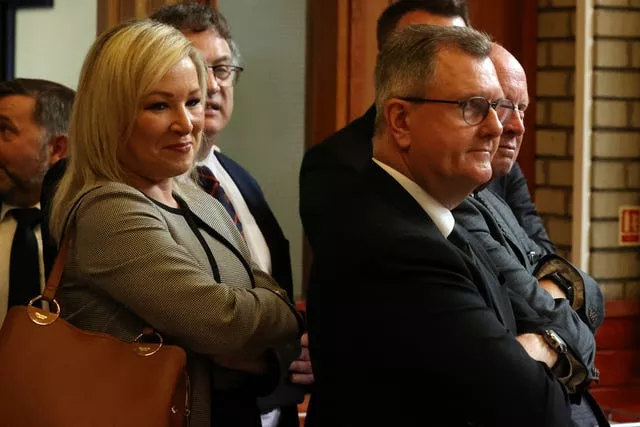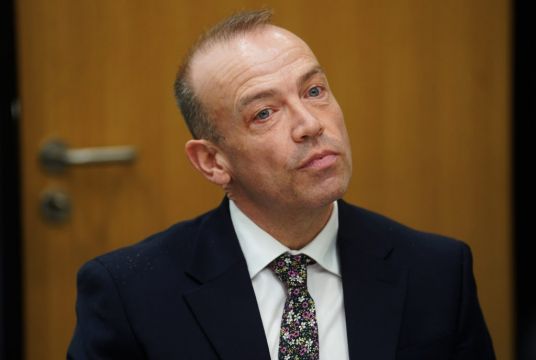Britain's Northern Ireland secretary is to hold talks with Stormont leaders as a deadline for calling another election in the North approaches.
Chris Heaton-Harris has repeatedly warned that he will call a Stormont poll if Friday’s deadline passes without a devolved executive being formed.
A six-month legislative timeframe to form an administration expires just after midnight early on Friday.
If no ministerial executive is in place by then, the UK government assumes a legal responsibility to call another election.
The DUP has refused to engage with the devolved institutions in Belfast in the wake of May’s Assembly election, meaning it has not been possible to form an executive.

The party’s boycott is part of a campaign of opposition to the Northern Ireland Protocol and the DUP says it will not return to powersharing until decisive action is taken to remove the protocol’s economic barriers on trade between Britain and Northern Ireland.
The British government has vowed to secure changes to the protocol, either by a negotiated compromise with the EU or through proposed domestic legislation – the Northern Ireland Protocol Bill – which would empower ministers to scrap the arrangements without the approval of Brussels.
The European Commission has warned that such unilateral action at Westminster would be in breach of international law and could prompt retaliatory action.
Talks with the EU resumed recently, with both London and Brussels talking up the potential of reaching an agreed solution but no breakthroughs are expected ahead of the election deadline.
While the UK government has the ability to amend the legislation and prevent a winter election, Mr Heaton-Harris has made it clear he will call a fresh poll if the deadline passes, with December 15 the likely date.
British prime minister Rishi Sunak has not confirmed whether he intends to stick with this approach as the deadline draws nearer but he did reappoint Mr Heaton-Harris as Northern Ireland secretary on Tuesday evening.
The North's Assembly is being recalled on Thursday for a special sitting ahead of the deadline.
The sitting will see an attempt to elect a new speaker – a pre-requisite before an executive can be appointed – but that bid is set to fail as the DUP will use its veto to block it.
MLAs will then debate a motion, tabled by Sinn Féin in consultation with the Alliance Party, that will focus on the cost-of-living crisis, the current instability at Westminster and the ongoing absence of devolved government at Stormont.
The first failed attempt to elect a new speaker came in May following the election. The Assembly has been recalled on two further occasions since, the last being in August.
While Northern Ireland currently has no first or deputy first ministers, other ministers who served in the previous mandate have remained in post following May’s election, albeit they have been significantly constrained in the decisions they can take.
If Friday’s deadline passes without a full executive having been established, those remaining ministers will cease to hold office.
On Wednesday, the leaders of an industry body warned that Northern Ireland businesses are facing a “tipping point” and require the help of a functioning executive.
The president and vice president of the Northern Ireland Chamber of Commerce and Industry urged politicians at Stormont and in Westminster to reach a resolution which would restore the powersharing institutions.
The President & Vice-President of @NIChamber have released a joint statement today, saying:
💬"This week is a pivotal moment for the Northern Ireland economy....We are at a tipping point that at the very least requires a functioning Executive."https://t.co/EU2Lv7bBdZ— NIChamberofCommerce #heretohelp (@NIChamber) October 26, 2022
Gillian McAuley, president of the NI Chamber, and vice president Cathal Geoghegan said this week was “pivotal” for the North's economy.
A joint statement said: “Over 170 days have passed since the election and within days we could be without local ministers.
“That’s more time lost for decisions about spending and overdue reforms on health, climate change and planning.
“Employers are in a cost-of-doing business crisis and our households are seeing the greatest squeeze on their finances of any UK region.
“We are at a tipping point that at the very least requires a functioning Executive.
“We do not underestimate the political challenges, but decisions need to be made.
“We have been here before and are all too familiar with life without an Executive.
“We cannot repeat the stagnation of 2017-2020.
“Today, we urge all our political stakeholders at Stormont and in Westminster to reach a resolution with the sense of urgency it demands.”







